《People&Properties》杂志第三期(二)
牛津译林版英语九下Unit2《Greatpeople》(Grammar)说课稿
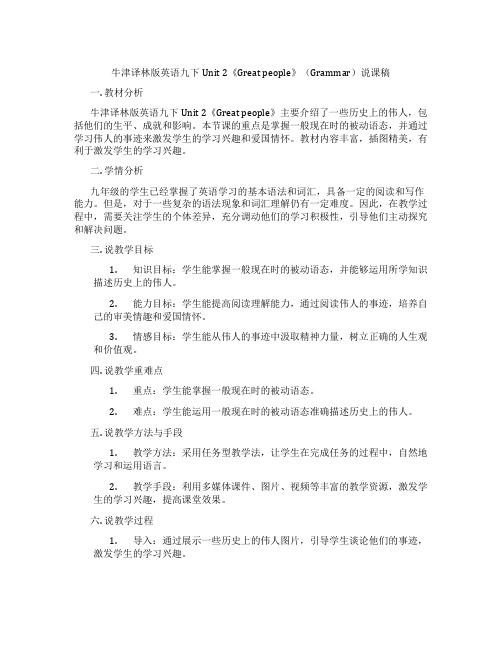
牛津译林版英语九下Unit 2《Great people》(Grammar)说课稿一. 教材分析牛津译林版英语九下Unit 2《Great people》主要介绍了一些历史上的伟人,包括他们的生平、成就和影响。
本节课的重点是掌握一般现在时的被动语态,并通过学习伟人的事迹来激发学生的学习兴趣和爱国情怀。
教材内容丰富,插图精美,有利于激发学生的学习兴趣。
二. 学情分析九年级的学生已经掌握了英语学习的基本语法和词汇,具备一定的阅读和写作能力。
但是,对于一些复杂的语法现象和词汇理解仍有一定难度。
因此,在教学过程中,需要关注学生的个体差异,充分调动他们的学习积极性,引导他们主动探究和解决问题。
三. 说教学目标1.知识目标:学生能掌握一般现在时的被动语态,并能够运用所学知识描述历史上的伟人。
2.能力目标:学生能提高阅读理解能力,通过阅读伟人的事迹,培养自己的审美情趣和爱国情怀。
3.情感目标:学生能从伟人的事迹中汲取精神力量,树立正确的人生观和价值观。
四. 说教学重难点1.重点:学生能掌握一般现在时的被动语态。
2.难点:学生能运用一般现在时的被动语态准确描述历史上的伟人。
五. 说教学方法与手段1.教学方法:采用任务型教学法,让学生在完成任务的过程中,自然地学习和运用语言。
2.教学手段:利用多媒体课件、图片、视频等丰富的教学资源,激发学生的学习兴趣,提高课堂效果。
六. 说教学过程1.导入:通过展示一些历史上的伟人图片,引导学生谈论他们的事迹,激发学生的学习兴趣。
2.新课呈现:介绍一般现在时的被动语态,并通过示例让学生理解其含义和用法。
3.课堂练习:设计一些练习题,让学生巩固所学知识,并及时给予反馈和指导。
4.小组讨论:让学生分组讨论伟人的事迹,并尝试用一般现在时的被动语态进行描述。
5.展示环节:邀请学生上台展示自己的作品,大家共同评价和欣赏。
6.总结:对本节课的内容进行总结,强调一般现在时的被动语态的用法。
7.作业布置:设计一些课后作业,让学生巩固所学知识。
牛津译林版英语九下Unit 2《Great people》(Checkout)教学设计

牛津译林版英语九下Unit 2《Great people》(Checkout)教学设计一. 教材分析牛津译林版英语九下Unit 2《Great people》主要介绍了三位伟人——爱因斯坦、牛顿和海底捞CEO张勇的事迹。
通过学习他们的故事,学生可以了解这些伟人的品质和成就,培养自己的品质和追求。
本课的语言目标主要是掌握一般过去时的被动语态,以及相关的词汇和短语。
二. 学情分析九年级的学生已经掌握了英语学习的基本知识,具备一定的听说读写能力。
但学生在学习过程中,对一般过去时的被动语态还较难理解,需要通过具体的情境和例子来进行讲解和操练。
同时,学生对伟人的事迹和品质有一定的了解,但还需要通过课堂的学习,进一步深化理解和认识。
三. 教学目标1.语言目标:学生能够掌握一般过去时的被动语态,以及相关的词汇和短语。
2.能力目标:学生能够听懂、会说、会读、会写关于伟人故事的一般过去时的被动语态句子。
3.情感目标:学生通过学习伟人的事迹,培养自己的品质和追求。
四. 教学重难点1.教学重点:学生能够掌握一般过去时的被动语态,以及相关的词汇和短语。
2.教学难点:学生能够运用一般过去时的被动语态,描述伟人的事迹和品质。
五. 教学方法1.情境教学法:通过设定具体的情境,让学生在真实的语境中学习和使用一般过去时的被动语态。
2.交际教学法:通过小组讨论和角色扮演等方式,让学生在实际的语言交流中,掌握和运用一般过去时的被动语态。
3.案例教学法:通过分析伟人的事迹,让学生从中汲取经验和启示,培养自己的品质和追求。
六. 教学准备1.教师准备:教师需要提前熟悉教材内容,了解学生的学习情况,准备好相关的教学材料和课件。
2.学生准备:学生需要预习教材内容,了解本课的学习目标和要求。
七. 教学过程1.导入(5分钟)通过展示爱因斯坦、牛顿和张勇的照片,让学生猜测他们是谁,引起学生对伟人的兴趣和好奇心。
2.呈现(10分钟)教师通过课件,呈现三位伟人的事迹,让学生听懂并理解他们的一般过去时的被动语态句子。
北师大版高二上Unit13《People》word测试
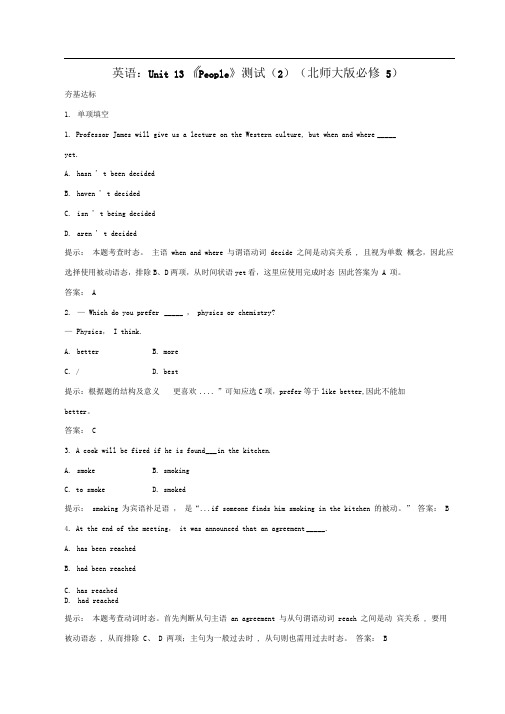
英语:Unit 13《People》测试(2)(北师大版必修5)夯基达标1.单项填空1.Professor James will give us a lecture on the Western culture, but when and where _____yet.A.hasn ' t been decidedB.haven ' t decidedC.isn ' t being decidedD.aren ' t decided提示:本题考查时态。
主语when and where 与谓语动词decide 之间是动宾关系, 且视为单数概念,因此应选择使用被动语态,排除B、D两项,从时间状语yet看,这里应使用完成时态因此答案为 A 项。
答案: A2.—Which do you prefer _____ , physics or chemistry?—Physics, I think.A.betterB. moreC. /D. best提示:根据题的结构及意义更喜欢.... ”可知应选C项,prefer等于like better,因此不能加better。
答案: C3. A cook will be fired if he is found ___ i n the kitchen.A.smokeB. smokingC. to smokeD. smoked提示:smoking 为宾语补足语,是“...if someone finds him smoking in the kitchen 的被动。
” 答案: B4.At the end of the meeting, it was announced that an agreement _____ .A.has been reachedB.had been reachedC.has reachedD.had reached提示:本题考查动词时态。
部编版六年级英语上册《Unit5FamousPeople》教案及教学反思
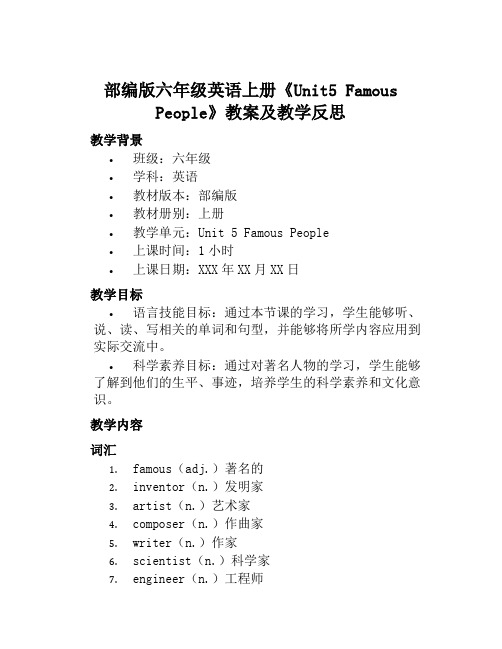
部编版六年级英语上册《Unit5 Famous People》教案及教学反思教学背景•班级:六年级•学科:英语•教材版本:部编版•教材册别:上册•教学单元:Unit 5 Famous People•上课时间:1小时•上课日期:XXX年XX月XX日教学目标•语言技能目标:通过本节课的学习,学生能够听、说、读、写相关的单词和句型,并能够将所学内容应用到实际交流中。
•科学素养目标:通过对著名人物的学习,学生能够了解到他们的生平、事迹,培养学生的科学素养和文化意识。
教学内容词汇1.famous(adj.)著名的2.inventor(n.)发明家3.artist(n.)艺术家poser(n.)作曲家5.writer(n.)作家6.scientist(n.)科学家7.engineer(n.)工程师8.politician(n.)政治家9.doctor(n.)医生句型1.Who’s your favorite famous person? 你最喜欢的名人是谁?2.He/She is a/aninventor/artist/composer/writer/scientist/engineer/ politician/doctor. 他/她是一位发明家/艺术家/作曲家/作家/科学家/工程师/政治家/医生。
文化知识1.Albert Einstein 爱因斯坦:著名的物理学家,相对论的创立者。
2.Vincent van Gogh 梵高:荷兰著名画家,后印象派的代表人物之一。
3.Ludwig van Beethoven 贝多芬:德国著名音乐家,代表作品有《第九交响曲》。
4.William Shakespeare 莎士比亚:英国文学史上最重要的文学家之一,代表作品有《哈姆雷特》。
5.Marie Curie 玛丽·居里:波兰籍科学家,是第一个获得两次诺贝尔奖的人。
6.Thomas Edison 托马斯·爱迪生:美国发明家,发明了许多重要的机器和电器,代表作品有电灯、电话等。
高中英语 Unit13 lesson1《People》EQ IQ课件3 北师大版必修5
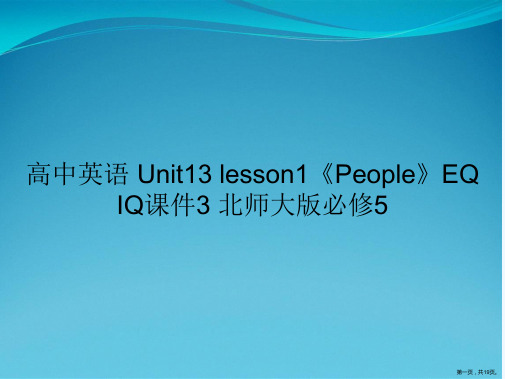
第四页,共19页。
Decide whether the following are right or not.
1. EQ can help you achieve success in your scientific
第七页,共19页。
2. predict:
v. to see or describe in advance as a result of knowledge,
experience, thought etc.预言,预见 经济学家预言通货膨胀(inflation)率将会增长. The economists predicted an increase in the rate of inflation. 算命先生预言我会同一名医生结婚.
He suggests that when predicting future successes, a person’s IQ might actually matter less than a person’s EQ.
2. Why do some best and smartest students end up failing exams according to Prof. Salovey?
The fortune-teller predicted that I would marry a doctor. 很难预见 这件事什么时候发生. It’s hard to predict when it will happen.
第八页,共19页。
Prediction n.
牛津译林版九年级下册Unit2《Greatpeople》说课稿3

牛津译林版九年级下册Unit 2《Great people》说课稿3一. 教材分析《牛津译林版九年级下册Unit 2 Great people》是一篇关于伟人的文章,通过介绍历史上的伟人,让学生了解他们的成就和对世界的影响。
本课的主要内容是介绍三位伟人:孙中山、孔子和牛顿,以及他们的贡献。
文章难度适中,语言简洁明了,内容富有教育意义。
二. 学情分析九年级的学生已经具备了一定的英语基础,能够听懂并运用一些基本的英语句型。
但是,他们在阅读理解、词汇量和语法方面还存在一定的困难。
因此,在教学过程中,需要注重培养学生的阅读理解能力,扩大词汇量,并加强语法教学。
三. 说教学目标1.知识目标:让学生掌握文章中的关键词汇和句型,理解文章大意,了解孙中山、孔子和牛顿的贡献。
2.能力目标:培养学生运用英语进行阅读理解的能力,提高学生的词汇量和语法水平。
3.情感目标:激发学生对伟人的敬仰之情,培养学生的爱国情怀和社会责任感。
四. 说教学重难点1.重点:文章中关键词汇和句型的学习,理解文章大意。
2.难点:词汇量和语法的学习,以及阅读理解能力的提高。
五. 说教学方法与手段1.教学方法:采用任务型教学法,让学生在完成任务的过程中,自然而然地学习到文章中的关键词汇和句型。
2.教学手段:利用多媒体课件,图片,视频等辅助教学,提高学生的学习兴趣和参与度。
六. 说教学过程1.导入:通过展示孙中山、孔子和牛顿的图片,引导学生谈论伟人,引入本课主题。
2.阅读理解:让学生阅读文章,回答相关问题,培养学生的阅读理解能力。
3.词汇教学:通过对文章中的关键词汇进行讲解和练习,提高学生的词汇量。
4.语法教学:通过文章中的句型,进行语法讲解和练习,提高学生的语法水平。
5.小组讨论:让学生分组讨论,总结孙中山、孔子和牛顿的贡献,培养学生的合作意识。
6.情感教育:引导学生学习伟人的品质和精神,激发学生的爱国情怀和社会责任感。
7.总结:对本课内容进行总结,强调重点知识点。
《Famous People》 说课稿

《Famous People》说课稿尊敬的各位评委老师:大家好!今天我说课的题目是《Famous People》。
下面我将从教材分析、学情分析、教学目标、教学重难点、教学方法、教学过程以及教学反思这几个方面来展开我的说课。
一、教材分析《Famous People》是教材版本教材中具体单元的内容。
本单元以“著名人物”为主题,通过介绍一些具有影响力的人物,让学生了解他们的成就和贡献,同时也学习相关的词汇、句型和语法知识。
教材中的文本选材丰富多样,包括传记、新闻报道等,语言真实、生动,能够激发学生的学习兴趣。
此外,教材还设置了多种练习和活动,如阅读理解、写作、口语表达等,旨在培养学生的综合语言运用能力。
二、学情分析我所教授的学生是年级的学生,他们经过了一段时间的英语学习,已经具备了一定的基础词汇和语法知识,能够进行简单的英语交流。
但是,他们在阅读理解和书面表达方面还存在一些不足,需要进一步提高。
同时,这个年龄段的学生对新鲜事物充满好奇心,对名人的故事也比较感兴趣。
因此,在教学过程中,可以充分利用这一点,激发学生的学习积极性,提高教学效果。
三、教学目标1、知识目标(1)学生能够掌握本单元的重点词汇,如achievement、influence、contribution 等。
(2)学生能够理解并运用与著名人物相关的句型,如“He/She is famous for” “His/Her contribution tois significant”(3)学生能够了解一些著名人物的生平事迹和成就。
2、技能目标(1)通过阅读练习,提高学生的阅读理解能力,能够快速获取关键信息。
(2)通过写作练习,培养学生的书面表达能力,能够用英语描述一个著名人物。
(3)通过口语交流活动,提升学生的口语表达能力,能够流利地介绍自己喜欢的著名人物。
3、情感目标(1)激发学生对著名人物的崇敬之情,培养他们的积极向上的人生态度。
(2)增强学生的文化意识,了解不同领域的杰出人物对社会的贡献。
牛津译林版英语九下Unit 2《Great people》(Main task)教学设计

牛津译林版英语九下Unit 2《Great people》(Mn task)教学设计一. 教材分析牛津译林版英语九下Unit 2《Great people》主要介绍了三位伟人——爱因斯坦、牛顿和天子——的生平和贡献。
本单元的主题是“伟人”,通过学习伟人的事迹和品质,激发学生的学习兴趣和追求卓越的精神。
本节课的教学内容主要包括阅读三位伟人的介绍,了解他们的成就和品质,以及完成相关练习。
二. 学情分析九年级的学生已经具备了一定的英语基础,能够进行简单的英语阅读和听说。
但是,对于一些较高级的词汇和表达方式,学生可能还不够熟悉。
此外,学生对于伟人的认识可能仅限于课本知识,对于他们的生平事迹和品质的理解可能不够深入。
三. 教学目标1.知识目标:学生能够掌握本节课的主要词汇和句型,能够阅读并理解关于爱因斯坦、牛顿和天子的介绍。
2.能力目标:学生能够通过阅读和听力,获取信息并归纳总结,提高阅读理解能力。
3.情感目标:学生能够了解伟人的成就和品质,激发他们追求卓越的精神。
四. 教学重难点1.重点:学生能够掌握本节课的主要词汇和句型,能够阅读并理解关于爱因斯坦、牛顿和天子的介绍。
2.难点:学生能够运用所学的词汇和句型,表达自己对伟人的理解和看法。
五. 教学方法1.任务型教学法:通过完成各种任务,激发学生的学习兴趣,提高学生的参与度。
2.合作学习:通过小组讨论和合作,培养学生的团队合作能力和沟通能力。
3.启发式教学:教师提出问题,引导学生思考和探索,提高学生的思维能力。
六. 教学准备1.教材:牛津译林版英语九下Unit 2《Great people》教材。
2.多媒体设备:电脑、投影仪、音响等。
3.教学素材:爱因斯坦、牛顿和天子的相关资料。
七. 教学过程1.导入(5分钟)教师通过提问方式引导学生回顾上节课的内容,同时引入本节课的主题——伟人。
教师可以提问:“你们知道哪些伟人?他们有什么共同特点?”2.呈现(10分钟)教师展示爱因斯坦、牛顿和天子的图片,引导学生猜测他们的身份和贡献。
《Unit 8 People and Events Language Practice》学历案-中职

《People and Events Language Practice》学历案(第一课时)一、学习主题本课学习主题为“People and Events Language Practice”,旨在通过学习,使学生能够熟练掌握与人物和事件相关的英语表达方式,提升在真实场景中的英语应用能力。
二、学习目标1. 知识与理解:掌握与人物和事件相关的基本英语词汇和句型结构。
2. 技能:能够运用所学英语表达方式描述人物特征和事件经过。
3. 情感态度与价值观:培养学生对英语学习的兴趣和自信心,以及跨文化交流的意识。
三、评价任务本课评价任务包括以下几个方面:1. 词汇运用:能够正确使用本课所学的词汇和短语描述人物特征和事件。
2. 口语表达:能够流利、准确地用英语表达人物和事件的描述性语言。
3. 互动交流:在小组活动中,能够积极参与讨论,用英语进行交流。
四、学习过程1. 导入新课(5分钟)通过图片或视频展示人物和事件的场景,引导学生用英语描述所看到的内容,激发学生的学习兴趣。
2. 词汇学习(10分钟)呈现本课重点词汇和短语,通过例句、图片等方式帮助学生理解和记忆。
学生跟读并尝试运用所学词汇进行造句练习。
3. 句型结构学习(10分钟)讲解与人物和事件相关的基本英语句型结构,如描述人物特征的句型“He/She is…”以及描述事件经过的句型“What happened?”。
学生进行模仿练习,尝试用所学句型结构进行造句。
4. 课文朗读与理解(10分钟)学生朗读课文,理解文中描述的人物和事件。
教师提问,学生回答,检查学生对课文的理解程度。
5. 口语实践(10分钟)学生进行小组活动,用英语描述一个指定的人物或事件。
小组成员互相评价,教师给予指导和反馈。
6. 总结与作业布置(5分钟)总结本课所学内容,布置相关作业。
要求学生用所学词汇和句型结构写一篇短文,描述一个自己熟悉的人物或事件。
五、检测与作业1. 课堂检测:通过提问、造句练习等方式检测学生对本课所学知识的掌握情况。
《实用英语口译教程(第三版)(上)》参考译文

《实用英语口译教程》(第三版)(上)口译练习参考译文(仅供参考)第3单元1. Interpret the following Chinese idioms into English.(1)to harbor/have/out of/with ulterior motives; with malicious intent; to have an axe to grind(2)to go back on one’s words; to play fast and loose; to blow hot and cold; to chop and change; inconsistent/undependable/self-contradictory(3)to lord it over (others/all); to play the tyrant; to dominate/domineer and swashbuckle(4)to act in bad faith; to play foul/false; treacherous; to go back on one’s words(5)arrogant and conceited; self-important; to ride the high horse; false pride; to get too big for one’s boots(6)to work hand in glove with; to band together; to collaborate/collude with sb. in evil doing(7)Courtesy demands reciprocity; to exchange on an equal basis/footing(8)The united will of the masses is like a fortress; People with one will are stronger than a fortress; Unity isstrength.(9)blinded by one’s gains (by the lust for gain/the love of gain/self-interests); to bend one’s principles to one’sinterests; to be so obsessed with the idea of profit-making that one loses all sense of righteousness(10)to eat one’s own bitter fruit (the fruit of one’s own doing/the fruit of one’s own making); to reap what onesows; to bite off one’s own head; to face the consequences of one’s own action(11)Honest advice is unpleasant to the ear.(12)to court one’s own ruin/doom/disaster; to invite one’s own destruction; to cut one’s own throat; to bringdestruction to oneself; to take the road to one’s doom(13)to go against the trend of the times; to set back the clock; to push a reactionary policy;retrogressive/perverse acts(14)to intensify one’s efforts to do sth; to become aggravated; to be further intensified; with ever-increasingintensity(15)to be obvious to all; as clear as day(16)as always; just as in the past; as before(17)to exaggerate just to scare/frighten people; alarmist talk; sensational(18)to make irresponsible remarks/criticisms(19)to surrender a country’s sovereign rights under humiliating terms; to humiliate the nation by forfeiting itssovereignty(20)to invite/bring a wolf into the house; to open the door to an enemy(21)no end of trouble for the future; Endless troubles will follow.(22)to be filled with indignation(23)the trend of the time; the general trend(24)to run counter to …(25)to cling obstinately to one’s course; to act willfully; to insist on having one’s own way(26)to reap the spoils of victory without lifting a finger; to profit from other’s conflict(27)Neighbors are dearer than distant relatives. Neighbors are more helpful than distant relatives. A remotekinsfolk is not as good as a near neighbor.(28)the same medicine prepared with different water; the same old stuff with a different label; a change in formbut not in essence(29)to lift a rock only to crush/squash one’s own feet; to tread on one’s own tail(30)to defy public opinion (the will of the people); to fly/go in the face of the will of the people (public opinion);to face universal condemnation(31)Beauty is in the eyes of the beholder. Love sees no fault. Beauty lies in the lover’s eyes. Love blinds a man toimperfections.(32)Many kiss the baby for the nurse’s sake; The drinker’s heart is not in his cup —he has something else in hismind. One talks about one thing, but tries to do another.(33)While the magistrates are free to burn down houses, the common people are forbidden even to light lamps.One may steal a horse while another may not look over a hedge.(34)Living near a wolf’s den, you can never be too cautious.(35)Of all the living things nurtured between heaven and earth, the most valuable is the human beings.(36)You want the horse to run fast and yet you don’t let it graze.(37)Storms gather without warning in nature, and bad luck befalls men overnight. The weather and human life areboth unpredictable.(38)A person cannot be judged by his appearance, just like the sea cannot be measured with a bucket. A personcan no more be judged by his looks than the sea be measured with a bucket.(39)Man cannot be always fortunate just as flowers do not last forever.(40)Blood is thicker than water, the falling leaves settle on the roots.(41)Haughtiness invites losses while modesty brings profits.(42)One’s position alters the temperament, just as nourishment affects the body. Honors change manners.(43)Nothing is so strong as gentleness. Nothing is so gentle as strength.(44)Like the Eight Fairies/Immortals crossing the sea, each displays his own talent/magic power.(45)On festive occasion, more often than ever, we think of our dear ones far away.(46)Among bosom friends, a thousand cups of wine are not too many/enough. A thousand cups of wine are toofew when drinking with close friends.(47)As the saying goes, “What’s near cinnabar goes red, and what’s next to ink turns black.”(48)Those who are meant to meet will meet even if they are separated by a thousand miles; those who are notmeant to meet will not get acquainted even if they brush past each other.(49)Preparedness ensures success and unpreparedness spells failure. Forewarned, forearmed.(50)Spare the rod and spoil the child.(51)The well-fed simply have no idea of how the starving suffers. Little does the fat sow know what the leanmeans.(52)Nearest the king, nearest the gallows.(53)As heaven maintains vigor through movement, a gentleman should constantly strive for self-perfection.(54)It takes more than a day to freeze three feet of ice. Rome was not built in a day.(55)No pains, no gains. No gains without pains.(56)When I walk along with two others, they may serve as my teachers. I will select their good qualities andfollow them, their bad qualities and avoid them. When I walk along with several people, they can serve as my teachers. I select their good qualities and emulate them, their bad qualities and amend them.(57)Sun Zi said, “War is a matter of vital importance to the state, a matter of life and death. Hence, it is imperativethat it be thoroughly studied.”(58)I recall my first lesson on calculus in senior high school. My teacher quoted a line from Zhuang Zi, a Chinesephilosopher over 2,000 years ago, which reads: “Cut away half of a rod and keep on halving what is left, and there will be no end to that process.” This gave me a vivid concept of limit.2. Interpret the following English idioms into Chinese.(1)有眼无珠(2)镇定自若(3)易如反掌(4)称心如意的境遇;安乐窝(5)进退两难(6)直言不讳(7)机不可失,时不再来(8)跟某人开玩笑;骗某人(9)假心假意地(10)雷声大雨点小(11)过于心直口快;过于直率(12)江山易改,本性难移(13)千里之堤,溃于蚁穴(14)和坏人打交道,必须提高警惕(15)试金石试金,金子则考验人(16)山外有山,天外有天(17)实践得真知(18)巧妇难为无米之炊(19)一事成功,事事顺利(20)知足常乐(21)不要过早乐观(22)人多好办事(23)天网恢恢,疏而不漏(24)谁笑在最后,谁笑得最美(25)草率结婚后悔多(26)单方面礼貌不会长久(27)物以类聚,人以群分(28)窃钩者诛,窃国者侯(29)说到曹操,曹操就到(30)人不为己,天诛地灭(31)覆水难收,后悔无益(32)上梁不正下梁歪(33)不入虎穴,焉得虎子(34)时不我待(35)豺狼活,则羊羔死(36)雄辩是银,沉默是金(37)债务还得早,朋友交得长(38)没有不带刺的玫瑰;没有尽善尽美的快乐(39)迟到总比不到好(或晚做总比不做好)(40)良牛产劣犊(好的父母未必培养出好的子女)第4单元(1) Meeting a Visiting US Military Delegation at the AirportMaj. Gen. Xiao Yang (X), Director of the Foreign Affairs Office of the Chinese Ministry of National Defense (MND), is at the airport to welcome a US military delegation headed by Maj. Gen. Smith (外). With him is Maj. Zhao Hua (Z), an interpreter from the Office.Z: 请问,您是美国军事代表团团长史密斯将军吗? //外:是的,我是美国来的约翰·史密斯。
优秀英语作文范文《Deaf People》
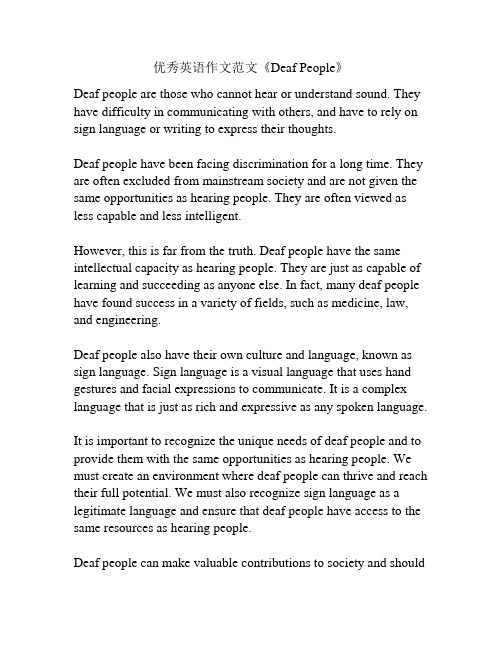
优秀英语作文范文《Deaf People》Deaf people are those who cannot hear or understand sound. They have difficulty in communicating with others, and have to rely on sign language or writing to express their thoughts.Deaf people have been facing discrimination for a long time. They are often excluded from mainstream society and are not given the same opportunities as hearing people. They are often viewed as less capable and less intelligent.However, this is far from the truth. Deaf people have the same intellectual capacity as hearing people. They are just as capable of learning and succeeding as anyone else. In fact, many deaf people have found success in a variety of fields, such as medicine, law, and engineering.Deaf people also have their own culture and language, known as sign language. Sign language is a visual language that uses hand gestures and facial expressions to communicate. It is a complex language that is just as rich and expressive as any spoken language.It is important to recognize the unique needs of deaf people and to provide them with the same opportunities as hearing people. We must create an environment where deaf people can thrive and reach their full potential. We must also recognize sign language as a legitimate language and ensure that deaf people have access to the same resources as hearing people.Deaf people can make valuable contributions to society and shouldnot be excluded or discriminated against. We must create an inclusive society where everyone is respected and valued.。
Unit 9《People》课件1(22页)(北师大版七年级下)

beard
• beard • have • Christmas father has
a beard.
clothes
• coat, suit, shirt, tie, pants, dress…
• be wearing
Zhou xun is wearing a yellow sweater and gray pants.
She has shoulderlength, straight, black hair.
hair
• She has long, wavy, black hair.
hair
• He has short, curly, black hair.
eyes
• big, little • blue, brown, green • have
hair
long,medium, short curly, wavy, straight black, brown, blond
She has long, straight, brown hair.
hair
• short, straight, blond • have
She has short, straight, blond hair.
• tall, medium, short • be
A is short.
B is tall.
C is medium tall.
C has a medium
A
height.
BC
• tall, short • be
height
Liu xiang is tall.
Pan changjiang is short.
高中英语 Unit 13《People》Lesson 4 First Impressions教案 北师大版必修5
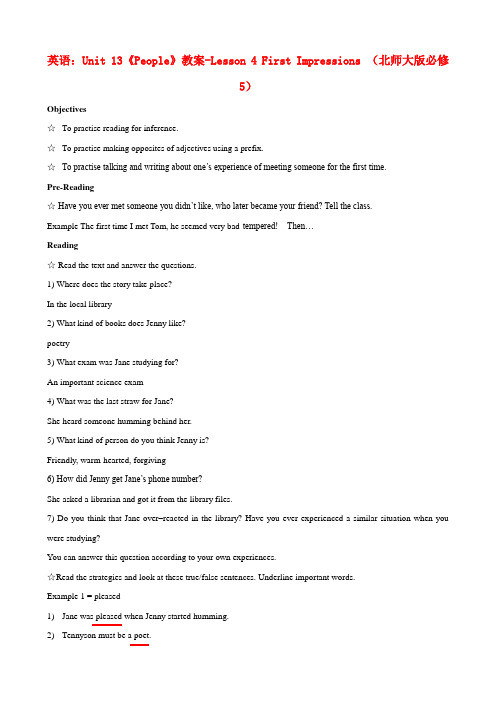
英语:Unit 13《People》教案-Lesson 4 First Impressions (北师大版必修5)Objectives☆To practise reading for inference.☆To practise making opposites of adjectives using a prefix.☆To practise talking and writing about one’s experience of meeting someone for the first time.Pre-Reading☆Have you ever met someone you didn’t like, who later became your friend? Tell the class.Example The first time I met Tom, he seemed very bad-tempered! Then…Reading☆ Read the text and answer the questions.1) Where does the story take place?In the local library2) What kind of books does Jenny like?poetry3) What exam was Jane studying for?An important science exam4) What was the last straw for Jane?She heard someone humming behind her.5) What kind of person do you think Jenny is?Friendly, warm-hearted, forgiving6) How did Jenny get Jane’s phone number?She asked a librarian and got it from the library files.7) Do you think that Jane over–reacted in the library? Have you ever experienced a similar situation when you were studying?You can answer this question according to your own experiences.☆Read the strategies and look at these true/false sentences. Underline important words.Example 1 = pleased1)Jane was pleased when Jenny started humming.2)Tennyson must be a poet.3)Jane first saw Jenny near the poetry section.4)Jane was upset that she had left her book in the library.5)Jane didn’t feel that it was necessary to apologise.Answers: FTTTFPost-Reading☆Complete the paragraph below with the correct form of the following words.glance, annoy, recognize, concentrate, disturb,resist, whisper, glare, inconsiderate, gratefulJanet was 1) on writing an essay when a noise 2) her. She 3)Her brother’s whistling. “Shh” she 4),5) at him quickly. The noise didn’t stop.Janet 6)the urge to scream and instead 7) at him angrily. “Please stop it, Simon. You are being very 8) ,” she said. But still he didn’t stop. Janet was now very 9) .Just then her father called Simon out of the room. Janet smiled, feeling 10) to her dad.Answers: 1concentrating 2disturbed 3recognised 4whispered 5glancing 6resisted 7glared 8inconsiderate 9annoyed 10grateful☆V ocabulary: opposites●You can often make opposites of adjectives using a prefix.Example able/unable, pleased/displeased, considerate/inconsiderateUse prefixes to make opposites of the underlined words.Peter is very organized and reliable. He is also sociable, sensitive and tolerant. He seems interested in or aware of other people’s feelings and is often kind. When you ask him for something, he is always sympathetic and helpful.I think he must be very satisfied with his life.Answers: unreliable, intolerant, unaware, unkind, unsympathetic, unhelpful, dissatisfied●Sometimes adjectives have a direct opposite.Example old/young, short/tall●Think of opposites for these adjectives:Bad-tempered, generous, hard-working, nervous, shy, strongAnswers: good-tempered, mean, lazy, confident, out-going, weak●Now use adjecti ves to write five sentences about yourself and people you know.Example I am sometimes disorganized, but usually I am reliable.Writing and speaking☆ Make notes about the first time you met someone.Who/when/where you metXiaoming (my new neighbour), last month, in the streetWhat he/she was doinggoing into his house with his bikewhat he/she said or didasked about my family/showed me his catwhat he/she seemed likecheerful, a bit shyLanguage points:1.The day that I met my best friend for the first time I was in a terrible mood.第一次遇到我最好的朋友那天,我情绪很坏。
《People-in-My-Neighbourhood》My-Neighbourhood-PPT课件

5.一条裤子__________a__p_a__ir of pants 6.sound like_________听___起_ 来像 7.an enjoyable job____一__份___令__人__愉_ 快的工作 8. be full of __________盛__满__,装满 9.by 7:00 a.m.________到__七__点__钟
10.要求某人做某事___C__a_n_a__d_i_a_n_________
11.忙于做某事_______b__e_b__u_s_y__d__o_i_n_g__s_th.
interview
三、课堂研讨助学
• 1.Who likes being a tailor?
Mr.Green.
材料:First I came to Mr.Green’s tailor shop.He
单项选择 四、当堂训练检测
( )1.---Do you know the song Gangnam Style? ---Of course. It ______ interesting.
A.tastes B.smells C.sounds D.feels ( )2.There are two bottles on the dest. One is full ____
长风破浪会有时,直挂云帆济沧海。努力,终会有所收获,功夫不负有心人。以铜为镜,可以正衣冠;以古为镜,可以知兴替;以人为镜,可以明得失。前进的路上 照自己的不足,学习更多东西,更进一步。穷则独善其身,达则兼济天下。现代社会,有很多人,钻进钱眼,不惜违法乱纪;做人,穷,也要穷的有骨气!古之立大 之才,亦必有坚忍不拔之志。想干成大事,除了勤于修炼才华和能力,更重要的是要能坚持下来。士不可以不弘毅,任重而道远。仁以为己任,不亦重乎?死而后已, 理想,脚下的路再远,也不会迷失方向。太上有立德,其次有立功,其次有立言,虽久不废,此谓不朽。任何事业,学业的基础,都要以自身品德的修炼为根基。饭 而枕之,乐亦在其中矣。不义而富且贵,于我如浮云。财富如浮云,生不带来,死不带去,真正留下的,是我们对这个世界的贡献。英雄者,胸怀大志,腹有良策, 吞吐天地之志者也英雄气概,威压八万里,体恤弱小,善德加身。老当益壮,宁移白首之心;穷且益坚,不坠青云之志老去的只是身体,心灵可以永远保持丰盛。乐 其乐;忧民之忧者,民亦忧其忧。做领导,要能体恤下属,一味打压,尽失民心。勿以恶小而为之,勿以善小而不为。越是微小的事情,越见品质。学而不知道,与 行,与不知同。知行合一,方可成就事业。以家为家,以乡为乡,以国为国,以天下为天下。若是天下人都能互相体谅,纷扰世事可以停歇。志不强者智不达,言不 越高,所需要的能力越强,相应的,逼迫自己所学的,也就越多。臣心一片磁针石,不指南方不肯休。忠心,也是很多现代人缺乏的精神。吾日三省乎吾身。为人谋 交而不信乎?传不习乎?若人人皆每日反省自身,世间又会多出多少君子。人人好公,则天下太平;人人营私,则天下大乱。给世界和身边人,多一点宽容,多一份担 为生民立命,为往圣继绝学,为万世开太平。立千古大志,乃是圣人也。丹青不知老将至,贫贱于我如浮云。淡看世间事,心情如浮云天行健,君子以自强不息。地 载物。君子,生在世间,当靠自己拼搏奋斗。博学之,审问之,慎思之,明辨之,笃行之。进学之道,一步步逼近真相,逼近更高。百学须先立志。天下大事,不立 川,有容乃大;壁立千仞,无欲则刚做人,心胸要宽广。其身正,不令而行;其身不正,虽令不从。身心端正,方可知行合一。子曰:“知者不惑,仁者不忧,勇者不惧 者,不会把时间耗费在负性情绪上。好学近乎知,力行近乎仁,知耻近乎勇。力行善事,有羞耻之心,方可成君子。操千曲尔后晓声,观千剑尔后识器做学问和学技 的练习。第一个青春是上帝给的;第二个的青春是靠自己努力当眼泪流尽的时候,留下的应该是坚强。人总是珍惜未得到的,而遗忘了所拥有的。谁伤害过你,谁击 重要的是谁让你重现笑容。幸运并非没有恐惧和烦恼;厄运并非没有安慰与希望。你不要一直不满人家,你应该一直检讨自己才对。不满人家,是苦了你自己。最深 一个人,而是心里没有了任何期望。要铭记在心;每一天都是一年中最完美的日子。只因幸福只是一个过往,沉溺在幸福中的人;一直不知道幸福却很短暂。一个人 贡献什么,而不应当看他取得什么。做个明媚的女子。不倾国,不倾城,只倾其所有过的生活。生活就是生下来,活下去。人生最美的是过程,最难的是相知,最苦 的是真爱,最后悔的是错过。两个人在一起能过就好好过!不能过就麻利点分开。当一个人真正觉悟的一刻,他放下追寻外在世界的财富,而开始追寻他内心世界的 弱就是自己最大的敌人。日出东海落西山,愁也一天,喜也一天。遇事不转牛角尖,人也舒坦,心也舒坦。乌云总会被驱散的,即使它笼罩了整个地球。心态便是黑 可以照亮整个世界。生活不是单行线,一条路走不通,你可以转弯。给我一场车祸。要么失忆。要么死。有些人说:我爱你、又不是说我只爱你一个。生命太过短暂 不一定能得到。删掉了关于你的一切,唯独删不掉关于你的回忆。任何事都是有可能的。所以别放弃,相信自己,你可以做到的。、相信自己,坚信自己的目标,去 的磨难与挫折,不断去努力、去奋斗,成功最终就会是你的!既然爱,为什么不说出口,有些东西失去了,就在也回不来了!对于人来说,问心无愧是最舒服的枕头 他人的成功,被人嫉妒,表明自己成功。在人之上,要把人当人;在人之下,要把自己当人。人不怕卑微,就怕失去希望,期待明天,期待阳光,人就会从卑微中站 想去拥抱蓝天。成功需要成本,时间也是一种成本,对时间的珍惜就是对成本的节约。人只要不失去方向,就不会失去自己。过去的习惯,决定今天的你,所以,过 今天的一败涂地。让我记起容易,但让我忘记我怕我是做不到。不要跟一个人和他议论同一个圈子里的人,不管你认为他有多可靠。想象困难做出的反应,不是逃避 面对它们,同它们打交道,以一种进取的和明智的方式同它们奋斗。他不爱你,你为他挡一百颗子弹也没用。坐在电脑前,不知道做什么,却又不想关掉它。做不了 间帮你决定。如果还是无法决定,做了再说。宁愿犯错,不留遗憾。发现者,尤其是一个初出茅庐的年轻发现者,需要勇气才能无视他人的冷漠和怀疑,才能坚持自 把研究继续下去。我的本质不是我的意志的结果,相反,我的意志是我的本质的结果,因为我先有存在,后有意志,存在可以没有意志,但是没有存在就没有意志。 的福利,可以使可憎的工作变为可贵,只有开明人士才能知道克服困难所需要的热忱。立志用功如种树然,方其根芽,犹未有干;及其有干,尚未有枝;枝而后叶, 出现不是对愿望的否定,而是把愿望合并和提升到一个更高的意识无论是美女的歌声,还是鬓狗的狂吠,无论是鳄鱼的眼泪,还是恶狼的嚎叫,都不会使我动摇。即 难,已经开始了的事情决不放弃。最可怕的敌人,就是没有坚强的信念。既然我已经踏上这条道路,那么,任何东西都不应妨碍我沿着这条路走下去。意志若是屈从 它都帮助了暴力。有了坚定的意志,就等于给双脚添了一对翅膀。意志坚强,只有刚强的人,才有神圣的意志,凡是战斗的人,才能取得胜利。卓越的人的一大优点 的遭遇里百折不挠。疼痛的强度,同自然赋于人类的意志和刚度成正比。能够岿然不动,坚持正见,度过难关的人是不多的。钢是在烈火和急剧冷却里锻炼出来的, 么也不怕。我们的一代也是这样的在斗争中和可怕的考验中锻炼出来的,学习了不在生活面前屈服。只要持续地努力,不懈地奋斗,就没有征服不了的东西。
优秀英语作文范文《Deaf People》500字

优秀英语作文范文《Deaf People》500字Deaf people refer to those with severely impaired hearing. People born deaf have difficulty perceiving speech and communicating with others, making integration into society difficult. However, deaf people have their own set of unique attributes that make them successful in the professional world.A major asset of deaf people is their acute visual sense. Deaf people rely on their vision to communicate and understand the world around them, which naturally leads to a heightened visual awareness. This can be extremely helpful in many fields that require keen observation and attention to detail such as engineering and design.Deaf people also tend to be excellent communicators. Since they rely heavily on both sign language and lip-reading, deaf people become experts at reading body language. This kind of communication often allows them to form deeper connections with others. Furthermore, they are often adept at finding creative ways to communicate their ideas, making them invaluable team members.Deaf people also have the invaluable ability to listen carefully. By relying on their sense of sight to understand conversations, they learn to focus more intently on what is being said and to process information more quickly. This makes them ideal candidates for roles that require clear communication and critical thinking. Finally, deaf people are exceptionally resilient. They have had to struggle and adapt to a world that is biased against them, yet theyare still able to push forward and excel in their respective fields. This type of tenacity can often be a key factor in helping professionals reach new heights in their career.In conclusion, deaf people possess some valuable traits that can make them successful in many different industries. With appropriate support and guidance, deaf people can take advantage of their own strengths to carve out their own paths to success.。
北师大版高中英语必修五Unit 13《People》(Lesson 2)ppt课件1

课前自主学习
课堂互动探究
fault n.sth.that makes a person,thing etc imperfect 13.______ relief n.lessening or ending of pain,distress,anxiet 14.______
y,etc
shelter vt.give safety or protection 15.______
课前自主学习 课堂互动探究
characteristic n.a quality or feature of someone or s 6.______________ omething desire n.a strong hope or wish 7.______ satisfaction 8.______________ n.fulfilment of a need,demand,clai m,desire etc harvest 9.__________ n.the act of gathering crops requirement 10. ______________n.something that a college,employe r etc says you must have aboard 11. ________prep.on or onto a ship,plane or train upset 12. ______adj.unhappy and worried because something un pleasant has happened
be independent of...独立于……,不受……的约束
注意: depend on 表示 “ 依赖 ” ,动词 depend 后接介词 o n,形容词形式dependent “依靠的,依赖的”用be dependent o
